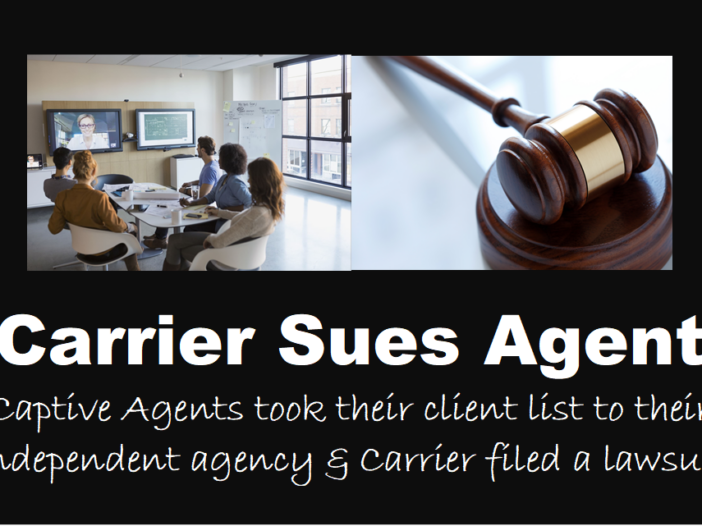
Independent insurance agents own their expirations and business records. Captive agents, who are independent contractors representing a single carrier, do not. Their expirations and records belong to the carrier. Some Massachusetts captive agents tried to use their records to compete against their carrier. Here is what happened.
One of the agents, who had previously managed an independent agency, signed a captive agency contract with the carrier in 2013. He hired the other agent; she subsequently signed her own contract and opened an agency for the carrier in 2014.

In 2014, a whistleblower wrote to the carrier’s corporate office that the two agents were violating their contracts. They were allegedly commingling business, the first agent was supposedly deeply involved in the other agent’s business, and they were allegedly sharing confidential customer information. The first agent was also supposedly sharing confidential information with his former independent agency and another company he had formed. He described it as a marketing company that sold sales leads, but the carrier viewed it as another agency.
The carrier subsequently terminated both agencies in late 2014 and 2015. Under the agency agreements, both agencies had to return all confidential information belonging to the carrier. However, the carrier came to suspect that they had not turned over everything. In late 2015, their lawyer sent the agents a letter suggesting that they were using the carrier’s information to solicit clients. The agents’ lawyer denied the charge, but several of the first agent’s former employees said otherwise.
The following summer, three of them wrote to the carrier. They claimed the two agents had spreadsheets containing information on thousands of the carriers’ customers. The agents had instructed these employees to contact them.
The next month, the carrier sued the two agents and the independent agency for breach of contract and misappropriation of trade secrets. The agents countersued the carrier.
During the discovery phase, the carrier convinced the judge to order a forensic examination of the agents’ computer systems for the carrier’s information. However, by the time the exam was conducted, two of the spreadsheets had been permanently deleted from the systems. The carrier was still able to obtain screenshots of spreadsheets displaying information that matched the carrier’s data.
The court subsequently ruled in the carrier’s favor, agreeing that the spreadsheets had contained the carrier’s confidential information and trade secrets. The agents’ counterclaims were dismissed. The agents appealed.
Interestingly, the agents tried to argue that they were in fact independent agents and thus the information belonged to them. The appellate judges didn’t buy it: “(W)e conclude that the district court was correct to focus on what we believe is the operative question … Who owns the expirations? These expirations seem akin to gold in the industry …” The judges ruled that the carrier did.
They also rejected the agents’ argument that the information on the spreadsheets was publicly available. “Even assuming (the first agent) retrieved some of this information from his claimed (public) sources, it would be difficult, if not impossible, to develop the spreadsheets — which listed thousands of (the carrier’s) customers, along with their personal and policy information — solely through those means.”
Ultimately, the court ruled that the spreadsheets were the carrier’s property and the agents had retained them improperly. The carrier had dropped its request for actual damages; the agents were held liable for $2.00 and the cost of attorneys’ fees.
Actions like those of these two agents tarnished the reputations of all. They signed contracts promising to return the carrier’s information after termination and not use it for their own gain. They broke those promises, and the carrier successfully asserted its rights.
If agents want control over customer data, they should become independent agents with all the advantages and risks those roles present. As these two agents found, they cannot have it both ways.
















